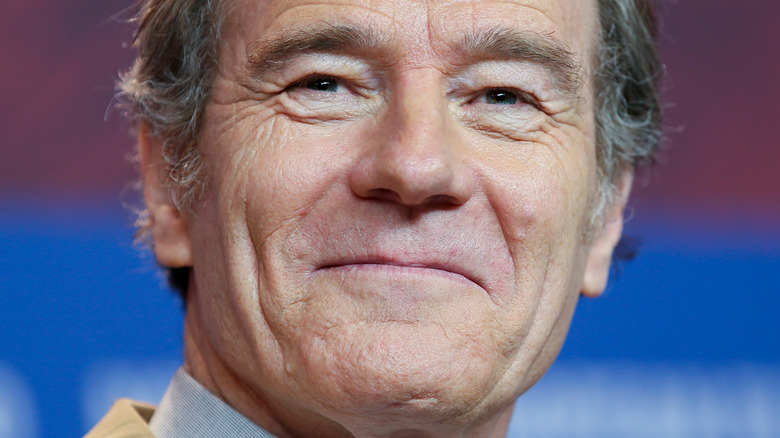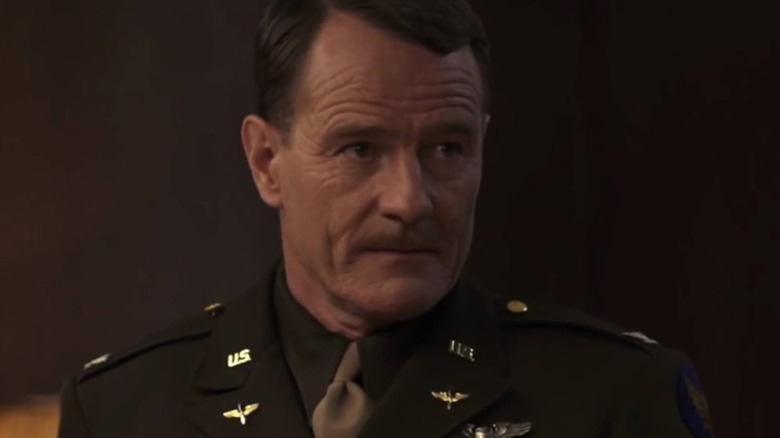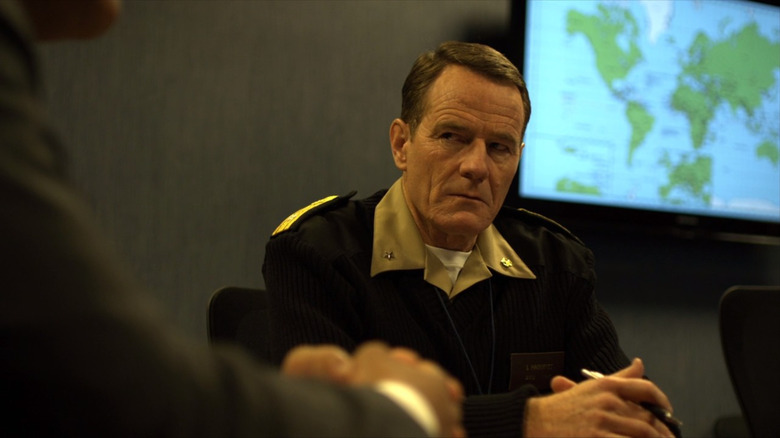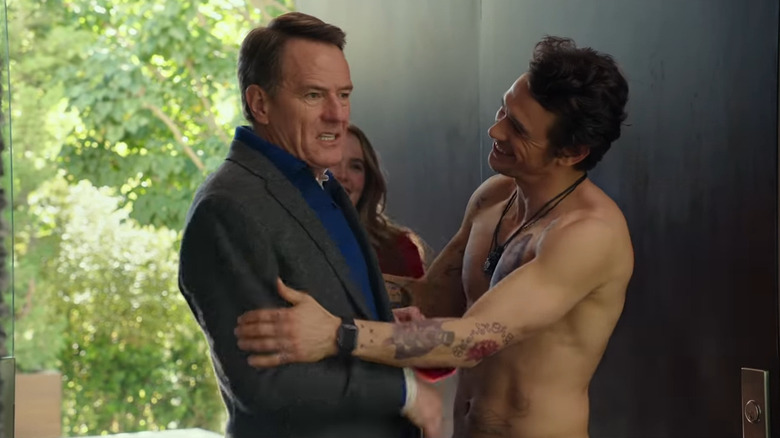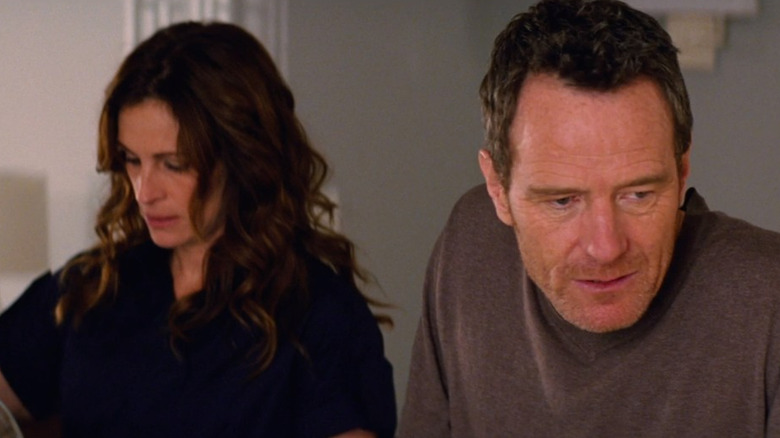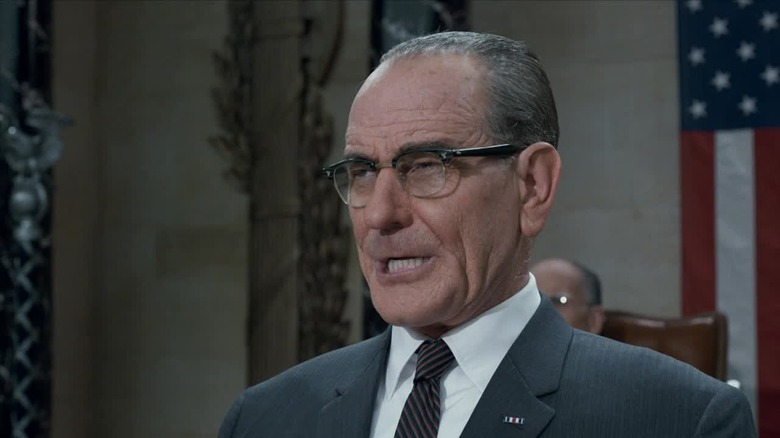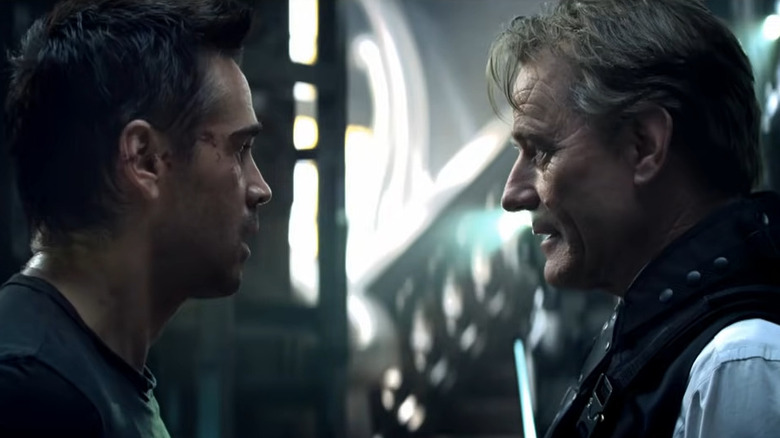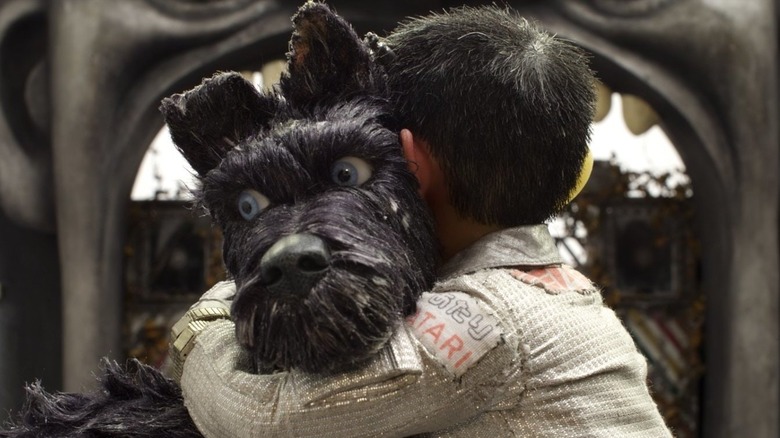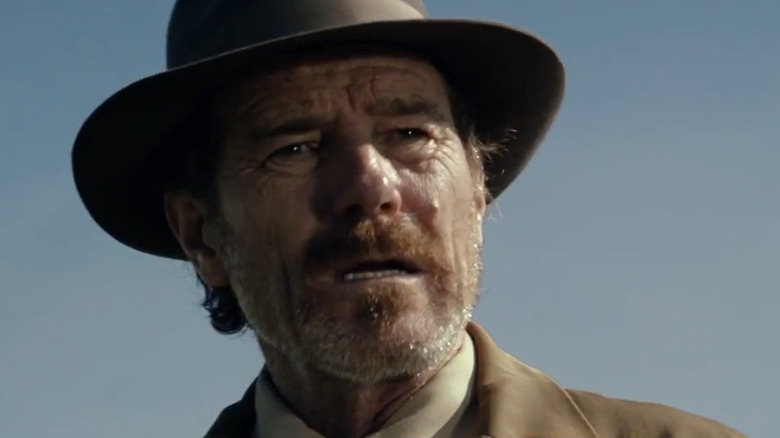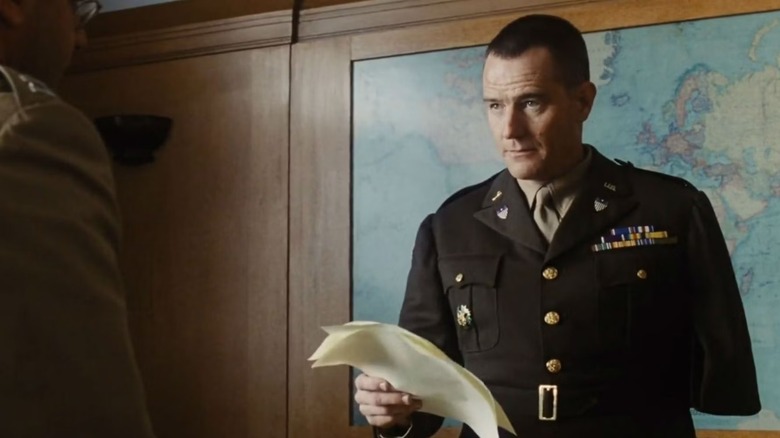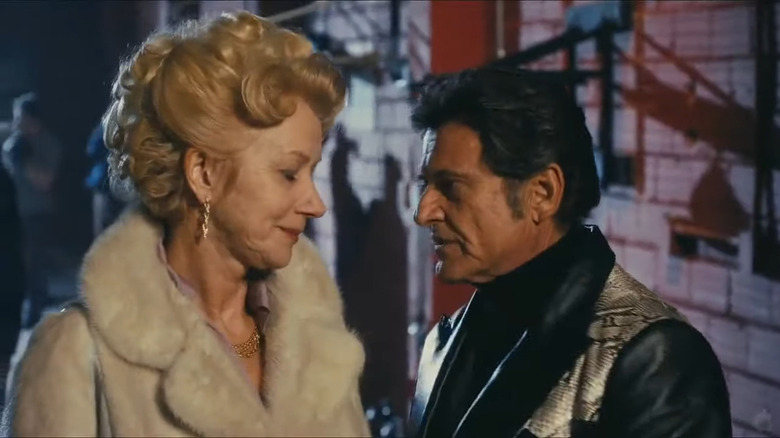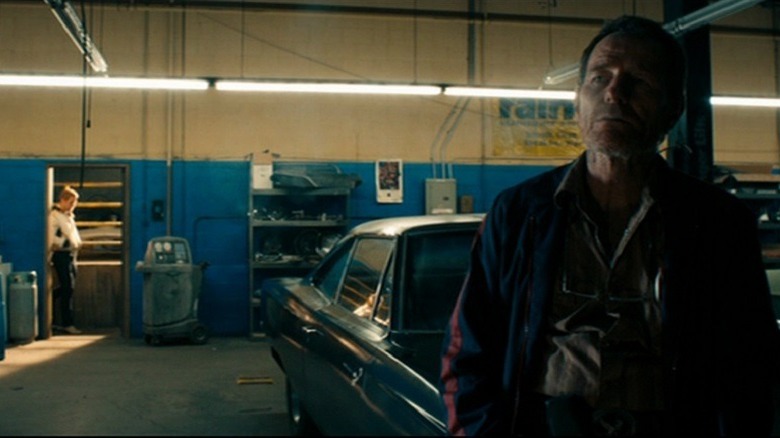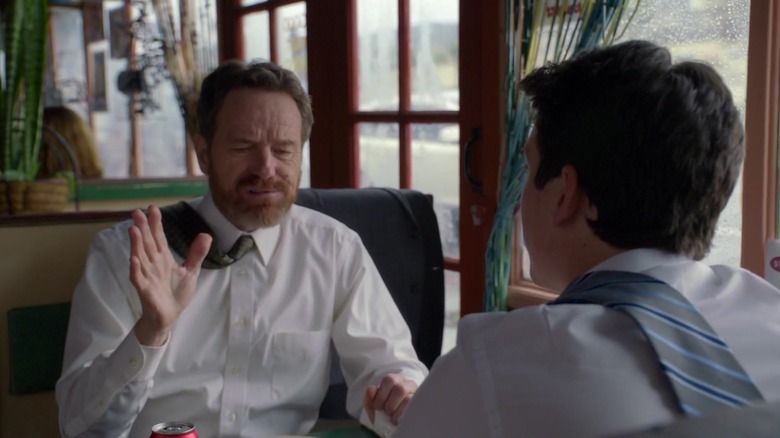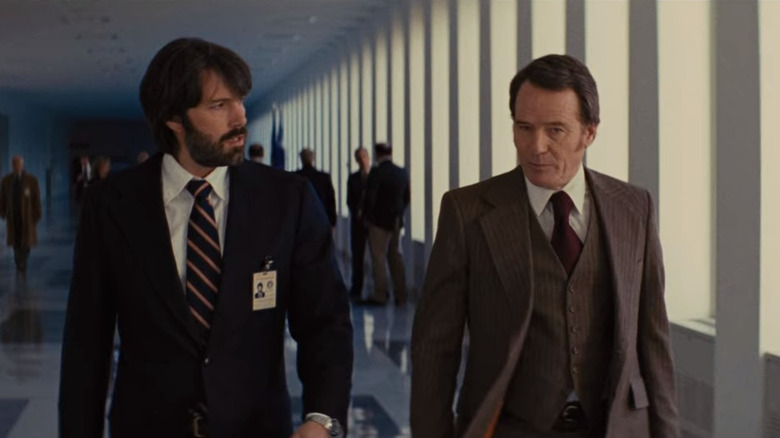Bryan Cranston's 7 Best And 7 Worst Movies Ranked
Bryan Cranston's most iconic roles as an actor have come from television shows. "Malcolm in the Middle" and, especially, "Breaking Bad" put this man on the map and established so many qualities about his gifts as a performer, including his range and his ability to convey such palpable humanity. But just because his most famous works have been on the small screen doesn't mean there haven't been noteworthy feature film performances from Cranston as well. Over the years, Cranston has cultivated a wide array of movie roles, with the ones he garnered after "Breaking Bad" taking him into leading man status through movies like "Trumbo" and "The Upside."
Cranston has proven so ubiquitous as a film actor that he's managed to appear in everything from courtroom dramas to the 2014 "Godzilla" blockbuster to raunchy comedies and everything in between. Across these performances, Cranston hasn't always appeared in masterpieces. No actor is devoid of critical duds in their career, and Cranston's most savaged movies prove he's no exception. But the seven best and worst-reviewed movies in Cranston's career all demonstrate the wide variety of parts this actor is willing to take, and they reinforce how his body of work is far more than two beloved TV shows.
Worst: Red Tails
A directorial effort from Anthony Hemingway, produced and written by George Lucas, "Red Tails" seeks to create a cinematic depiction of the Tuskegee Airmen and their groundbreaking contributions to World War II. There's a noble intent here to explore these historical figures as detailed human beings, as well as the anguish they faced in their quest to earn respect. That struggle is reflected in Bryan Cranston's character, Col. William Mortamus, an experienced military figure who has extreme doubts over the capabilities of a group of Black pilots.
But all of the best intentions, not to mention the presence of actors like Cranston, couldn't mitigate the flaws that informed the general critical reception of "Red Tails." Ina Diane Archer, a descendant of a Tuskegee Airman, summarized the most prevalent critiques of the movie for Film Comment. She had praise for certain aspects of the film, including performances given by cast members like Method Man, but she also took umbrage with several key facets of "Red Tails." She was especially frustrated by the lack of emotional scenes not set on airplanes soaring across the sky, as she felt the lack of character development in low-key sequences left the bigger set pieces feeling hollow.
Such observations were largely echoed throughout the critical reception to "Red Tails," which proved significantly less lastingly influential compared to the historical subjects it was chronicling.
Best: Contagion
Steven Soderbergh's love for star-studded ensemble casts ensured that the likes of Matt Damon, Jude Law, and Kate Winslet would feature heavily in his disease thriller "Contagion," where a deadly new virus is overtaking the planet. Also in the cast is Cranston as Rear Admiral Lyle Haggerty, a figure who's trying to bring order to a world stricken by chaos. Largely depicted working alongside lead character Dr. Ellis Cheever (Laurence Fishburne), Haggerty is far from a super prominent character in "Contagion," but Cranston's immediately compelling presence guarantees that the character leaves an impression whenever he's on-screen.
In addition to loving performances like Cranston's, critics were especially fond of what "Contagion" didn't do. Many critics enjoyed how the film subverted audience expectations for how a mainstream disaster movie should play out. The grim and intimate tone and the willingness to let bad things happen even to characters played by A-list actors — not to mention the fast-paced nature of Soderbergh's filmmaking — was like a breath of fresh air compared to other large-scale disaster movies. In other words, critics found "Contagion" to be a cure to the kind of ailments that usually bog down movies about global catastrophes threatening humanity.
Worst: Why Him?
While Bryan Cranston won his Emmys for portraying Walter White on "Breaking Bad," his initial big role as a TV actor was playing Hal on the comedic program "Malcolm in the Middle." Lighthearted stories built around laughs were ingrained into Cranston's DNA, and the 2016 film "Why Him?" gave Cranston a chance to revel in those gifts in a high-profile manner. Here, he got to indulge his funny bone by playing Ned Fleming, a buttoned-up older man whose daughter is about to marry the eccentric and wealthy Laird Mayhem (James Franco). The massive gulf between these two personalities is apparent from the get-go, and it should've been a recipe for a thoroughly entertaining comedy.
However, the film didn't get nearly as positive of marks as "Bad" or "Middle." In fact, "Why Him?" was widely disparaged. Part of the problem for many critics was how "Why Him?" shifted between raunchy derivative gags and a schmaltzy third-act with little to no grace. Neither element worked entirely well on its own, but they especially didn't go well together. Plus, there were widespread gripes that the project didn't let Cranston indulge in the kind of comedy he did best. Cranston has had tons of experience not just with comedy but successful comedy. So it's a shame that "Why Him?" failed to add another jewel to the actor's comedic crown.
Best: Kung Fu Panda 3
After appearing in "Madagascar 3: Europe's Most Wanted" as the Russian tiger Vitaly, Bryan Cranston returned to doing voice work for DreamWorks Animation by playing Po's long-lost father, Li, in "Kung Fu Panda 3." A character first teased in the final scene of "Kung Fu Panda 2," Cranston lent the character a goofball spirit but also an endearing sense of compassion that made it seem believable that this would be the birth father of the legendary Dragon Warrior. Though Cranston's presence was new for this animated franchise, "Kung Fu Panda 3" did maintain the critically acclaimed response that its predecessors received.
Granted, most critics agreed that "Kung Fu Panda 3" didn't break the mold that the earlier "Panda" adventures established. However, there was also a general consensus that this wasn't a fatal shortcoming given how entertaining the "Kung Fu Panda" saga had been up to this point. If your songs still sound good, there's nothing wrong with playing the familiar beats. There was also widespread praise for how "Kung Fu Panda 3" made good use of the digital 3D format to deliver eye-popping visuals to audiences, as well as how effectively actors like Bryan Cranston fit their respective roles. While some third movies are a turning point towards inferiority for some franchises, "Kung Fu Panda 3," armed with talented new cast members like Cranston, did not teeter towards that point.
Worst: Larry Crowne
While Bryan Cranston sent shivers down people's spine as Walter White, the 2011 feature "Larry Crowne" sees him playing someone far more pathetic. Here, he's Dean Tainot, the distant husband to the movies female lead, Mercedes Tainot (Julia Roberts). Cranston's character is a man who's distant from his spouse and much more enamored with, uh, adult online content than mending the relationship with his partner. It was bold against-type casting for Cranston ... but it wasn't enough make this movie worthwhile. Written, directed by, and starring Tom Hanks, "Larry Crowne" sputtered out when it came to spawning any good reviews.
The gravest shortcoming with "Larry Crowne" is how it's the wrong kind of mellow. Critics were united in noting that the film lacked any interesting forms of everyday conflict to liven up the plot. There was also recurring disappointment expressed over how Cranston's supporting performance was frustratingly undeveloped, one of many characters in the film seen as lacking any level of depth. While it was nice that "Larry Crowne" offered Cranston a chance to play someone different from his standard characters, going outside of the box didn't result in a memorable performance or help liven up "Larry Crowne" as a film.
Best: All the Way
The 2016 HBO movie "All the Way" wasn't the first time that Bryan Cranston played the role of Lyndon B. Johnson. In fact, he'd originated the role in "All the Way's" initial incarnation as a Broadway play. Cranston's performance as this U.S. president was so acclaimed that it ended up winning the actor a Tony. With so much buzz surrounding "All the Way," it was impossible for it to be contained to one medium forever. It was only a matter of time before it got adapted into a feature film. Once it got into this format, "All the Way" continued its stellar track record by scoring further acclaim from critics.
Much like its play form, the "All the Way" movie was widely seen as an acting exercise first and foremost. Michael E. Ross for The Wrap said as much in his review and noted that Cranston was especially "pitch-perfect" in his performance as Johnson. He and most other critics noted that Cranston was the highlight of the film and that not even layers upon layers of makeup and prosthetics could disrupt the tangible humanity of his acting. While some plays lose an extra something when being translated to film, Cranston's work as Lyndon B. Johnson in "All the Way" was as alive as ever in a feature film.
Worst: Total Recall
The 1990 "Total Recall" movie by director Paul Verhoeven is a classic for a reason. Not only is the action great, but the ambiguity over what's real and what isn't keeps moviegoers on the edge of their seats. Plus, the unabashed strangeness of the Mars sequences are unforgettable. It would've been a challenge for any filmmaker to attempt to remake such a beloved sci-fi title, but it didn't seem promising to have "Live Free or Die Hard" director Len Wiseman be the one to try and deliver an updated version.
One could see the movie procuring an A-list cast as a way to surmount the problems with being a remake to such a beloved sci-fi feature. Among those notable names in the cast is Bryan Cranston playing the film's primary bad guy, Chancellor Vilos Cohaagen. But the opportunity to see Cranston chew the scenery as a futuristic adversary wasn't enough to save the 2012 "Total Recall" remake, which was written off by critics as largely disposable. This even included people who weren't fans of the original "Total Recall," like Christopher Orr of The Atlantic. Orr, like so many critics, found himself yearning for the distinctive qualities of the earlier feature while experiencing this remake. Many critics also took umbrage with the grim tone of the production, which ended up sucking all the personality and fun out of performers like Cranston.
Best: Isle of Dogs
Wes Anderson is famous for working with his troupe of beloved actors on each of his movies. The likes of Jason Schwartzman, Bill Murray, and Owen Wilson are all bound to show up in the cast of a new Anderson feature. But he's also open to adding new familiar faces to the mix, as seen by the presence of Ralph Fiennes in "The Grand Budapest Hotel" and Bruce Willis in "Moonrise Kingdom," just to name two examples. Another instance of this is Bryan Cranston in the 2018 feature "Isle of Dogs," in which the "Breaking Bad" veteran voices the lead canine character Chief. Undertaking this voiceover work led to Cranston participating in one of the most critically acclaimed movies of his career.
The consensus across these reviews is that, much like with the directors acclaimed 2009 feature "Fantastic Mr. Fox," "Isle of Dogs" cemented that stop-motion animation is the perfect vessel for Wes Anderson's specific style of filmmaking and storytelling. The preciseness and attention to detail that define his works is more apparent than ever in animated titles where he can literally build the world from the ground-up. While the film did spark discussions over how it engaged in cultural appropriation, "Isle of Dogs" was largely received as yet another Wes Anderson classic.
Worst: In Dubious Battle
Before they worked together on projects like "Why Him?" and "The Disaster Artist," Bryan Cranston and James Franco joined forces for the 2017 adaptation of John Steinbeck's "In Dubious Battle," a story about workers striking during the Great Depression. Here, Cranston plays the role of Sheriff while Franco, in addition to directing the film, portrays the lead character of Mac McLeod. Even while working with the hallowed words of Steinbeck, "In Dubious Battle" was not one of Cranston's most beloved movies.
Across the reviews for "In Dubious Battle," there was a general frustration with how this adaptation came across as little more than a vanity project for Franco. While reviewers could see this artist was enjoying himself as a performer and director, he never made it so that the audience could also revel in getting passionate about this project. The result is a film that keeps audiences at arm's length. There was also criticism for "In Dubious Battle's" relationship to its source material, particularly how it erased the books thorniest and most complicated details, leaving a straightforward and tedious interpretation as a replacement. In other words, this particular pairing of Cranston with Franco did not yield much in the way of substantive cinema.
Best: Saving Private Ryan
The cast of "Saving Private Ryan" is jam-packed with big names. Even the titular Ryan, who spends much of the film off-screen, is still played by Matt Damon. Beyond him, Tom Hanks anchors the whole piece while everyone from Vin Diesel to Barry Pepper to Ted Danson shows up in the cast. Bryan Cranston also quickly appears in one of his first major live-action movie roles. Sometimes, you assemble a lot of talented performers only for the movie to be far less than the sum of its parts. "Saving Private Ryan" is not one example of this trend, with the movie receiving glowing marks from critics.
In addition to its cast, the unflinching look at loss in wartime, not to mention the harrowing D-Day opening, lends a level of emotional tangibility to "Saving Private Ryan" that has cemented its place as one of the all-time great films. The movie also nabbed Spielberg his second directing Oscar. Though Cranston is only a small part of this World War II epic, "Saving Private Ryan" still stands as one of the most acclaimed movies he's ever been in.
Worst: Love Ranch
Though Bryan Cranston is a prominent part of 2010's "Love Ranch," this "Malcolm in the Middle" alum would likely be the first to admit he isn't the most notable part of the cast. Instead, the most noteworthy aspect of the cast is how "Love Ranch" serves as one of only three live-action films that Joe Pesci has appeared in during the 21st century. Pesci isn't just around for a cameo, either — he's anchoring the entire feature with Helen Mirren. The mind reels to imagine what Pesci and Cranston could do on-screen together, especially in terms of the memorable dialogue you could have them exchange.
Unfortunately, featuring multiple actors famous for playing iconic criminals wasn't enough to save "Love Ranch" in its critical reception, as it was widely trashed in reviews. Many critics expressed frustration over how much potential there was in the film's plot and casting, but that director Taylor Hackford opted to focus on more formulaic and schmaltzy storytelling material instead. Nowhere was this better exemplified than in a review by Roger Ebert, who was crushed that the cast of "Love Ranch" never got material that was up to their skills as performers. The meeting of acting titans like Bryan Cranston and Joe Pesci deserved much better than this.
Best: Drive
In an interview with The A.V. Club, director Nicolas Winding Refn noted that he was determined to get Bryan Cranston to play the character of Shannon in "Drive" because of how much he adored his work on "Breaking Bad." However, after meeting with Cranston and talking to him about the part, Refn didn't hear from the actor for a long time. Refn eventually telephoned Cranston, and per the filmmaker's anecdote, the actor was wrestling with whether or not to play Shannon just as Refn gave him a call. Feeling like this coincidence had to be an important sign, Cranston proceeded to sign on to "Drive."
Agreeing to the role of Shannon — a crippled auto mechanic who's a friend and criminal cohort to Ryan Gosling's Driver — turned out to be a wise move for Cranston given that "Drive" would eventually become a critically acclaimed motion picture. The feature became well-known for its masterful minimalist filmmaking, memorable performances from the likes of Gosling and Albert Brooks, as well as how entertainingly Refn's filmmaking channeled the vibes of 1980s cinema. Even if he wasn't initially sure if he wanted to partake in this motion picture, "Drive" would become one of the best-reviewed movies in Cranston's career, a quiet thriller that puts the pedal to the metal when it comes to style.
Worst: Get a Job
It took a long while for "Get a Job" to get released. The feature, a production hailing from the now-defunct CBS Films studios, started shooting in April 2012. Considering it starred Miles Teller and Anna Kendrick, not to mention Bryan Cranston in a supporting role, it seemed like this would be another high-profile big-screen comedy. However, once principal photography finished, news on "Get a Job's" release date never came. Eventually, Kendrick would tell the podcast "WTF with Marc Maron" that actors like Cranston were constantly asking her when "Get a Job" would come out. It's a testament to just how troubled this film's release was that an actor of Cranston's caliber was in the dark over when it would ever see the light of day.
"Get a Job" would finally be unleashed on the world in March 2016, where it immediately received utterly disastrous reviews. Many critics expressed disappointment with how the talented cast of "Get a Job" was never utilized to the fullest of their abilities and instead were wasted on generic comedic antics about young people navigating the modern workplace. Other writers, such as Mike D'Angelo of The A.V. Club, also called attention to strange editing issues that not only signaled that "Get a Job" had been through some serious post-production woes but also further hampered an already bad comedy. Needles to say, "Get a Job" was nowhere near worth the prolonged wait it took to get this movie released.
Best: Argo
The tale of CIA officials trying to sneak six Americans out of Iran under the guise of making a sci-fi movie, "Argo" is the kind of story that would be too fantastical if it was pitched as a fictional feature film. To be translated properly into a narrative movie, this sensational rescue mission would have to be adapted with a group of actors who could lend immediate emotional reality to everything that was happening around them.
This made Bryan Cranston, who played the boss to CIA specialist Tony Mendez (Ben Affleck), a perfect pick to join this project. Though he'd done plenty of wacky comedies, Cranston's experience with projects like "Breaking Bad" meant that he was no stranger to having to convey emotional authenticity in storylines that, on paper, sound ludicrous.
"Argo" was a critical smash hit and was given massive amounts of praise from critics far and wide. Even if you were aware of how this historical rescue mission turned out, critics agreed you'd still be glued to the screen thanks to the magnetic filmmaking and performances. The members of "Argo's" ensemble cast, including Cranston, were showered with praise, and these performances were declared a key reason the film was as engaging was it was. Given all the glowing praise for "Argo," it should come as no surprise that the feature eventually took home the Academy Award for Best Picture, making this the only movie Bryan Cranston has appeared in to score such a prestigious trophy.
